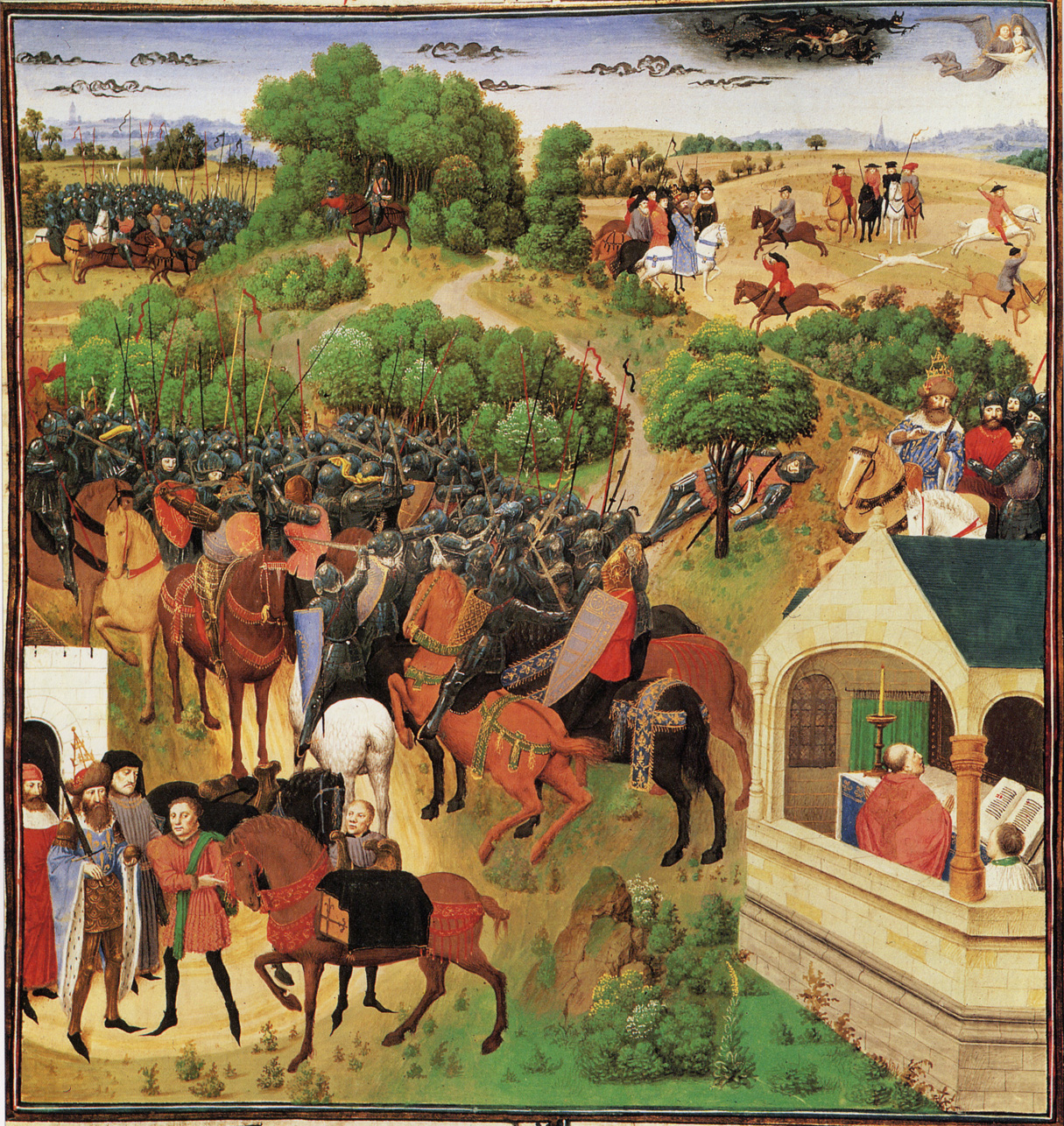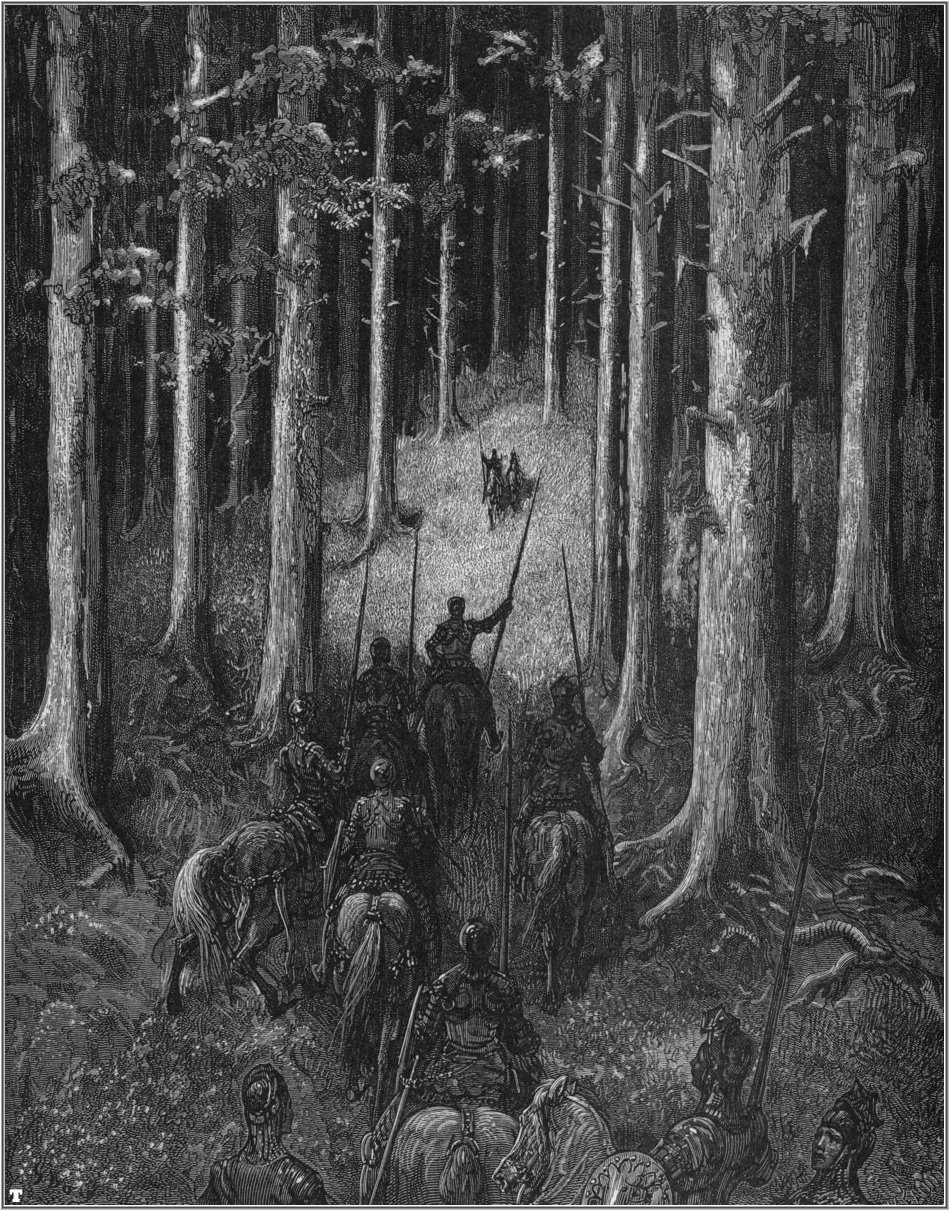|
Girard De Vienne
''Girart de Vienne'' is a late twelfth-century (c.1180Hasenohr, 547-548.) Old French ''chanson de geste'' by Bertrand de Bar-sur-Aube. The work tells the story of the sons of Garin de Monglane and their battles with the Emperor Charlemagne, and it establishes the friendship of the epic heroes Olivier and Roland. The poem comprises more than 6000 rhymed decasyllable verses Holmes, 260. grouped into laisses. It was likely based on a now lost earlier poem. The work was extremely popular up until the Renaissance, and was converted into a version with alexandrines (14th century) and five prose versions, including one by David Aubert (in his ''Chroniques et conquestes de Charlemagne''), one by Raffaele Marmora, one by Jean d'Outremeuse, and one attached to the prose version of '' Garin de Monglane.'' Plot In the beginning, each of the four sons of Garin de Monglane—Hernaut, Girart, Renier and Milon—comes into possession of a fief (Renier becomes the father of Olivier). But ... [...More Info...] [...Related Items...] OR: [Wikipedia] [Google] [Baidu] |
Old French
Old French (, , ; Modern French: ) was the language spoken in most of the northern half of France from approximately the 8th to the 14th centuries. Rather than a unified language, Old French was a linkage of Romance dialects, mutually intelligible yet diverse, spoken in the northern half of France. These dialects came to be collectively known as the , contrasting with the in the south of France. The mid-14th century witnessed the emergence of Middle French, the language of the French Renaissance in the Île de France region; this dialect was a predecessor to Modern French. Other dialects of Old French evolved themselves into modern forms ( Poitevin-Saintongeais, Gallo, Norman, Picard, Walloon, etc.), each with its own linguistic features and history. The region where Old French was spoken natively roughly extended to the northern half of the Kingdom of France and its vassals (including parts of the Angevin Empire, which during the 12th century remained under Anglo-N ... [...More Info...] [...Related Items...] OR: [Wikipedia] [Google] [Baidu] |
Saracen
upright 1.5, Late 15th-century German woodcut depicting Saracens Saracen ( ) was a term used in the early centuries, both in Greek and Latin writings, to refer to the people who lived in and near what was designated by the Romans as Arabia Petraea and Arabia Deserta. The term's meaning evolved during its history of usage. During the Early Middle Ages, the term came to be associated with the tribes of Arabia. The oldest known source mentioning "Saracens" in relation to Islam dates back to the 7th century, in the Greek-language Christian tract ''Doctrina Jacobi''. Among other major events, the tract discusses the Muslim conquest of the Levant, which occurred after the rise of the Rashidun Caliphate following the death of the Islamic prophet Muhammad. The Roman-Catholic church and European Christian leaders used the term during the Middle Ages to refer to Muslims—usually Arabs, Turks, and Iranians. By the 12th century, "Saracen" had become synonymous with "Muslim" in Med ... [...More Info...] [...Related Items...] OR: [Wikipedia] [Google] [Baidu] |
French Poems
French (french: français(e), link=no) may refer to: * Something of, from, or related to France ** French language, which originated in France, and its various dialects and accents ** French people, a nation and ethnic group identified with France ** French cuisine, cooking traditions and practices Fortnite French places Arts and media * The French (band), a British rock band * "French" (episode), a live-action episode of ''The Super Mario Bros. Super Show!'' * ''Française'' (film), 2008 * French Stewart (born 1964), American actor Other uses * French (surname), a surname (including a list of people with the name) * French (tunic), a particular type of military jacket or tunic used in the Russian Empire and Soviet Union * French's, an American brand of mustard condiment * French catheter scale, a unit of measurement of diameter * French Defence, a chess opening * French kiss, a type of kiss involving the tongue See also * France (other) * Franch, a surname * Fre ... [...More Info...] [...Related Items...] OR: [Wikipedia] [Google] [Baidu] |
Characters In Epic Poems
Character or Characters may refer to: Arts, entertainment, and media Literature * ''Character'' (novel), a 1936 Dutch novel by Ferdinand Bordewijk * ''Characters'' (Theophrastus), a classical Greek set of character sketches attributed to Theophrastus Music * ''Characters'' (John Abercrombie album), 1977 * ''Character'' (Dark Tranquillity album), 2005 * ''Character'' (Julia Kent album), 2013 * ''Character'' (Rachael Sage album), 2020 * ''Characters'' (Stevie Wonder album), 1987 Types of entity * Character (arts), an agent within a work of art, including literature, drama, cinema, opera, etc. * Character sketch or character, a literary description of a character type * Game character (other), various types of characters in a video game or role playing game ** Player character, as above but who is controlled or whose actions are directly chosen by a player ** Non-player character, as above but not player-controlled, frequently abbreviated as NPC Other uses in ar ... [...More Info...] [...Related Items...] OR: [Wikipedia] [Google] [Baidu] |
Chansons De Geste
The ''chanson de geste'' (, from Latin 'deeds, actions accomplished') is a medieval narrative, a type of epic poem that appears at the dawn of French literature. The earliest known poems of this genre date from the late 11th and early 12th centuries, shortly before the emergence of the lyric poetry of the troubadours and trouvères, and the earliest verse romances. They reached their highest point of acceptance in the period 1150–1250.Hasenohr, 242. Composed in verse, these narrative poems of moderate length (averaging 4000 lines) were originally sung, or (later) recited, by minstrels or jongleurs. More than one hundred ''chansons de geste'' have survived in approximately three hundred manuscripts''La Chanson de Roland,'' 12. that date from the 12th to the 15th century. Origins Since the 19th century, much critical debate has centered on the origins of the ''chansons de geste'', and particularly on explaining the length of time between the composition of the ''chanso ... [...More Info...] [...Related Items...] OR: [Wikipedia] [Google] [Baidu] |
12th-century Books
1 (one, unit, unity) is a number representing a single or the only entity. 1 is also a numerical digit and represents a single unit of counting or measurement. For example, a line segment of ''unit length'' is a line segment of length 1. In conventions of sign where zero is considered neither positive nor negative, 1 is the first and smallest positive integer. It is also sometimes considered the first of the infinite sequence of natural numbers, followed by 2, although by other definitions 1 is the second natural number, following 0. The fundamental mathematical property of 1 is to be a multiplicative identity, meaning that any number multiplied by 1 equals the same number. Most if not all properties of 1 can be deduced from this. In advanced mathematics, a multiplicative identity is often denoted 1, even if it is not a number. 1 is by convention not considered a prime number; this was not universally accepted until the mid-20th century. Additionally, 1 is the s ... [...More Info...] [...Related Items...] OR: [Wikipedia] [Google] [Baidu] |
Urban T
Urban means "related to a city". In that sense, the term may refer to: * Urban area, geographical area distinct from rural areas * Urban culture, the culture of towns and cities Urban may also refer to: General * Urban (name), a list of people with the given name or surname * ''Urban'' (newspaper), a Danish free daily newspaper * Urban contemporary music, a radio music format * Urban Outfitters, an American multinational lifestyle retail corporation * Urban Records, a German record label owned by Universal Music Group Place names in the United States * Urban, South Dakota, a ghost town * Urban, Washington Urban is an unincorporated community in Skagit County, in the U.S. state of Washington Washington commonly refers to: * Washington (state), United States * Washington, D.C., the capital of the United States ** A metonym for the federal governm ..., an unincorporated community See also * Pope Urban (other), the name of several popes of the Catholic Church ... [...More Info...] [...Related Items...] OR: [Wikipedia] [Google] [Baidu] |
William Of Gellone
William of Gellone ( 755 – 28 May 812 or 814), the medieval William of Orange, was the second Duke of Toulouse from 790 until 811. In 804, he founded the abbey of Gellone. He was canonized a saint in 1066 by Pope Alexander II."William of Aquitaine, St." Encyclopedia.com. Retrieved on 2014-01-17. In the tenth or eleventh century, a Latin hagiography, the ''Vita sancti Willelmi'', was composed. By the twelfth century, William's legend had grown. He is the hero of an entire cycle of '''', the earliest of which is the '' Chanson de Guillaume [...More Info...] [...Related Items...] OR: [Wikipedia] [Google] [Baidu] |
Geste De Garin De Monglane
''La Geste de Garin de Monglane'' is the second cycle of the three great cycles of '' chansons de geste'' created in the early days of the genre. It centres on Garin de Monglane. One of its main characters is William of Gellone. The cycle The cycle of Guillaume has more unity than the other great cycles of Charlemagne or of Doon de Mayence, the various poems which compose it forming branches of the main story rather than independent epic poems. There exist numerous cyclic manuscripts in which there is an attempt at presenting a continuous ''histoire poétique'' of Guillaume and his family. Manuscript Royal 20 D xi. in the British Museum contains eighteen chansons of the cycle. The conclusions arrived at by earlier writers are combated by Joseph Bédier in the first volume, "Le Cycle de Guillaume d'Orange" (1908), of his ''Legendes epiques'', in which he constructs a theory that the cycle of Guillaume d'Orange grew up round the various shrines on the pilgrim route to Saint Gille ... [...More Info...] [...Related Items...] OR: [Wikipedia] [Google] [Baidu] |
Renaud De Montauban
Renaud de Montauban (; also spelled ''Renaut'', ''Renault'', Italian: ''Rinaldo di Montalbano'', Dutch: ''Reinout van Montalba(e)n'') was a legendary hero and knight which appeared in a 12th-century Old French ''chanson de geste'' known as ''The Four Sons of Aymon''. The four sons of Duke Aymon are Renaud, Richard, Alard and Guiscard, and their cousin is the magician Maugris (French: ''Maugis'', Italian: ''Malagi'', ''Malagigi''). Renaud possesses the magical horse Bayard and the sword Froberge (Italian: ''Fusberta'', ''Frusberta'', French: '' Flamberge''). The story of Renaud was popular across Europe. The tale was adapted into Dutch, German, Italian and English versions throughout the Middle Ages, inspired the Old Icelandic '' Mágus saga jarls'', and also incited subsequent sequels and related texts that form part of the Doon de Mayence cycle of ''chansons''. Renaud, as Rinaldo, is an important character in Italian Renaissance epics, including ''Morgante'' by Luigi Pulci, ... [...More Info...] [...Related Items...] OR: [Wikipedia] [Google] [Baidu] |
Doon De Mayence
Doon de Mayence also known as Doolin de Maience, Doon de Maience or Doolin de Mayence was a fictional hero of the Old French ''chansons de geste'', who gives his name to the third cycle of the Charlemagne romances dealing with the feudal revolts. There is no single unifying theme in the ''geste'' of Doon de Mayence. The rebellious barons are connected by the poets with Doon by fictitious genealogical ties and all are represented as opposing Charlemagne, although their adventures—insofar as they possess a historical basis—generally occur before (or after) his reign. The general insolence of their attitude to the sovereign suggests that Charlemagne is here only a pseudonym for his weaker successors. The tradition of a traitorous family of Mayence (Mainz), which was developed in Italy into a series of stories about criminals, appeared later than the Carolingian cycle. A contributor to the Chronicle of Fredegar states (iv. 87) that the army of Sigebert was betrayed from withi ... [...More Info...] [...Related Items...] OR: [Wikipedia] [Google] [Baidu] |




